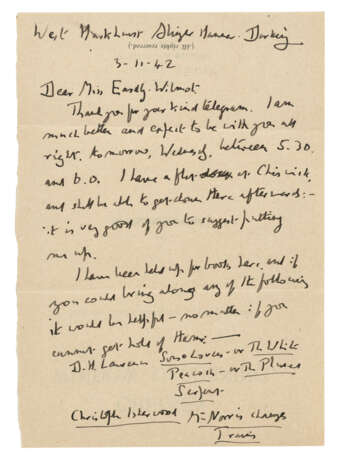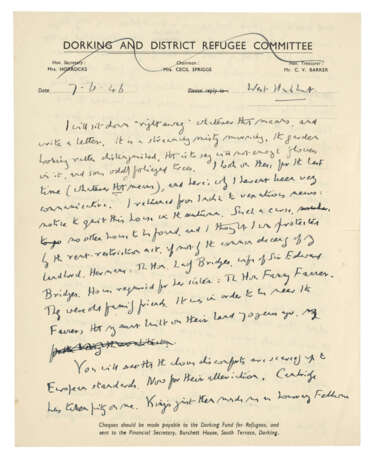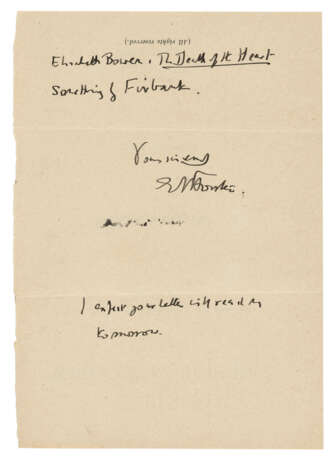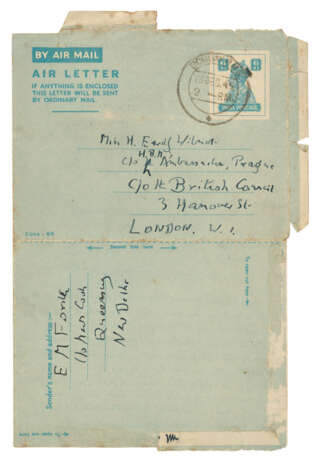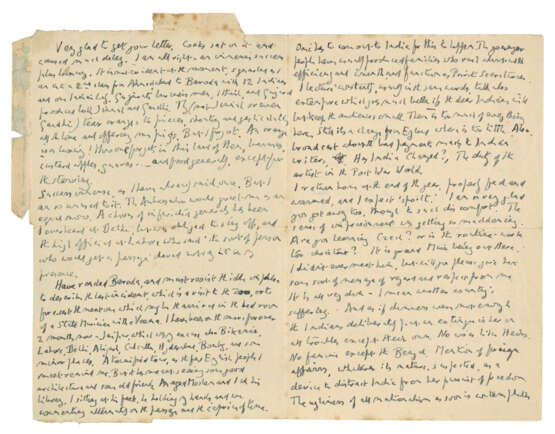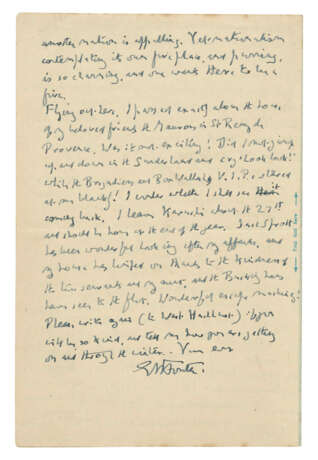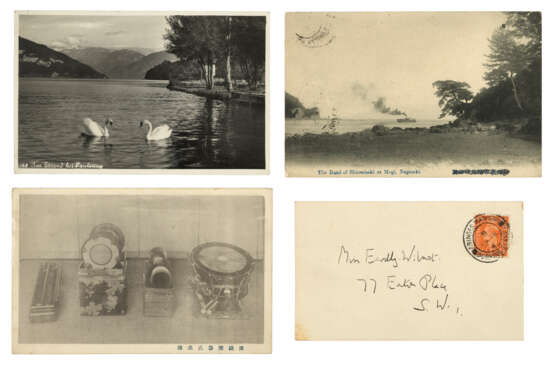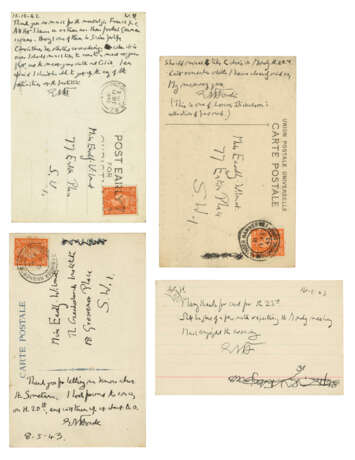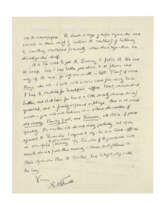ID 1349738
Лот 97 | Edward Morgan Forster (1879-1970)
Оценочная стоимость
£ 5 000 – 8 000
Series of 34 autograph letters and 21 cards signed, with three typed or secretarial letters signed, to Hazel Eardley-Wilmot, various locations, 1 November 1942 - 6 May 1970 and n.d.
Approx. 77 pages in autograph, various sizes, with a few envelopes; also two Christmas cards, a corrected typescript of Forster's introduction to a talk series about Czechoslovakia, 3 pages, and two printed items. Provenance: Sotheby's, 15 July 1999, lot 340.
'I don't know why, when people interest me so much, I should see them so badly'. A correspondence full of literary discussions with a wartime friend. The recipient was evidently the organiser of wartime talks for Czech refugees, and the early letters often discuss subject-matter for the talks, branching off into broader literary matters, and some personal news. In the earliest letter, on 1 November 1942, Forster warns her that he may be prevented from giving a talk by illness, suggesting as a substitute that 'someone read out longish passages from typical 20th cent. novels', giving as possibilities 'Bennett's Old Wives Tale (to illustrate the old descriptive method), V. Woolf's "From the Lighthouse" (poetic impressionism), and Isherwood's "Mr Norris Changes Trains" (description in the thirties)'. Six days later he refers to a successful talk the evening before, and to a radio broadcast which had caused some trouble for 'poor George Orwell'. On 30 November he proposes meeting the recipient for a meal at 'a restaurant where the food is bad, and where in consequence there is no crowd ... They specialise in warm fish salads'. An undated letter from the same period confesses to suffering from 'those feelings of flatness which Moliere always induces in me ... I'll try to put up some defences for Wordsworth. He keeps ringing a little bell, which sounded fainter as he grew old. But even when he addresses Machinery ("Motions and Means" he cautiously calls it) the tinkle gets through to me'. A letter of 29 May 1943 mentions John Maynard Keynes (who isn't replying to Forster's letters) and discusses Tolstoy, breaking off in the middle with 'I must stop for a minute, or rather for an hour, to mow the lawn'. On 4 September 1943 he declines to chair the talks himself: 'I don't know the subject, or the country (except that the construction of pancakes there is a serious matter), and I have a defect which would be particularly incapacitating: namely inability to recognise people ... I don't know why, when people interest me so much, I should see them so badly'. On 2 March 1944 Forster refers to the recent heavy air raids (presumably those of 24/25 February which hit west London heavily): 'I am glad indeed to learn that you are all right. Chiswick trembled too and Roger Fry struck(?) his head on the wall, as well he might, but nothing "gave", and here one still is'; he goes on to recount a self-deprecating anecdote about having followed 'a lady with a rather depressed face' who bought a secondhand copy of Where Angels Fear to Tread at Wimbledon station: 'I got into her compartment. We were alone. She opened the book at the beginning, gave a slight sigh, opened it at the end, gave a final look at the middle in order to be thorough, and, with a final sigh, put it down'. Other letters discuss R.L. Stevenson, Gibbon, Etherege, Congreve, films, operas, and the progress of the war. Amongst the post-war letters is an interesting air-mail letter from India, postmarked 12 Dec 1945, where he is enjoying 'immense success ... squashed as I am into a 2nd class from Ahmedabad to Baroda ... Gujurat produced both Jinnah and Gandhi ... I lecture constantly ... talk also extempore which goes much better if the dear Indians will but keep the audience small'. Later letters are more social in content, but include news of his move to Kings College, Cambridge and his work on Britten's Billy Budd ('I think it succeeds as a whole').
Hazel Eardley-Wilmot (1910-1998) worked for the British Council from 1941, and was much involved in helping Czech refugees during the war years; in later life she published three books about Exmoor.
| Автор: | Эдвард Морган Форстер (1879 - 1970) |
|---|---|
| Место происхождения: | Англия, Северная Европа, Европа, Великобритания |
| Категория аукционного дома: | Письма, документы и рукописи, Книги и рукописи |
| Автор: | Эдвард Морган Форстер (1879 - 1970) |
|---|---|
| Место происхождения: | Англия, Северная Европа, Европа, Великобритания |
| Категория аукционного дома: | Письма, документы и рукописи, Книги и рукописи |
| Адрес торгов |
CHRISTIE'S 8 King Street, St. James's SW1Y 6QT London Великобритания | |
|---|---|---|
| Предосмотр |
| |
| Телефон | +44 (0)20 7839 9060 | |
| Комиссия | see on Website | |
| Условия использования | Условия использования |
